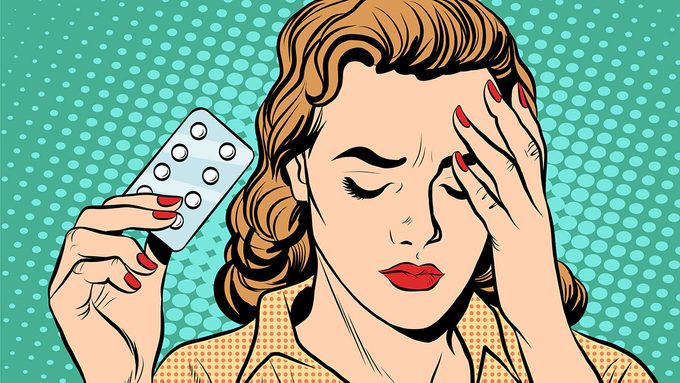If You Take Birth Control, You Could Have a Higher Risk of This One Cancer
A recent study has found a surprising new risk to hormonal contraception — but here’s why you shouldn’t be too worried.

Birth control may not be all its cracked up to be…
It’s almost a no-brainer that certain habits can increase our risk of cancer. Most of the time, however, those vices are fairly self-explanatory. Smoking, skimping on sunscreen, and heavy drinking can all increase your chances of developing the disease, for example. But now, research has revealed a rather shocking source of cancer, and one that few would think could increase their risk: hormonal birth control.
A massive new study suggests that women who take even low doses of birth control could have a higher risk of developing breast cancer, NPR reports. But thankfully, the increase is small enough that those who use hormonal contraceptives shouldn’t have serious concerns.
Why birth control can increase your risk of developing breast cancer
The research, published in the New England Journal of Medicine, gathered data on 1.8 million women between the ages of 15 and 49. Then, a research team compared the breast cancer rates between women who used hormonal birth control and those who used non-hormonal contraceptives — such as condoms or a copper IUD — over 11 years.
Ultimately, the results showed a 20 percent elevated risk of breast cancer for women who used any form of hormonal contraception. The risk continued to rise the longer the women used birth control, too. (Here are 8 things you should know about IUDs.)
But this isn’t a sign to flush your pills down the toilet. Keep in mind that breast cancer is quite uncommon among women in the age group studied to begin with. “A 20 percent increase of a very small number is still a very small number,” Mia Gaudet, an epidemiologist with the American Cancer Society, told NPR. In fact, you are just as likely to increase your breast cancer risk through physical inactivity, excessive weight gain in adulthood, or drinking an average of one or more alcoholic drinks per day, as you are by hormonal contraception, according to Gaudet.
Still worried about your risk? Consider the data. “The absolute increase in risk (found in the study) is 13 per 100,000 women overall, but only 2 per 100,000 women younger than 35 years of age,” epidemiologist David Hunter, an epidemiologist at the University of Oxford, wrote in an editorial that accompanied the study. “Most of the cases that occurred in this analysis occurred among women who were using oral contraceptives in their 40s.”
That said, experts recommend comparing the pros and cons of hormonal birth control and talking to your doctor before making any drastic changes to your contraceptive regimen — or it could throw your hormones out of whack.




